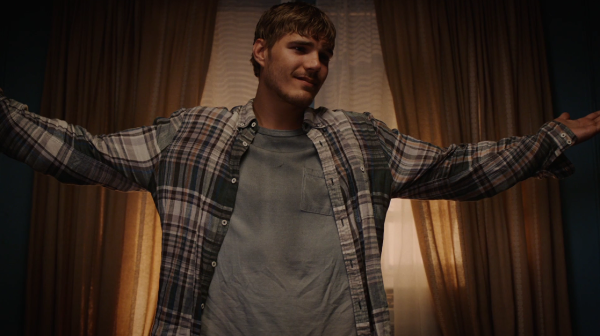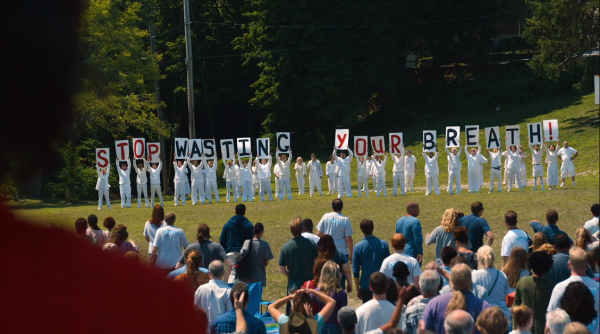
The end is near. Those four words, so simple when broken down into individual components, become loaded with meaning when strung together. Depending on the context, the phrase can offer relief – from a difficult task, from tedium, from agony – or spell doom, a harsh reminder of our own mortality and the impermanence of all things. It can be a promise or a warning.
Seemingly incompatible truths that nonetheless manage to coexist define The Leftovers, an apocalyptic soul search steeped equally in hope and despair. Anyone looking for definitive explanations or pat narratives will be sorely disappointed by Damon Lindelof and Tom Perrotta’s show, which follows what happens after 2 percent of the world’s population vanishes. Refusing to reduce the messiness of reality to easily digested messages, The Leftovers has never been content to merely comfort or wallow in its exploration of grief. It instead shifts between catharsis and ambiguity as it grapples with the effects of trauma, crises of faith and identity, and the urgent yet unanswerable question of what it means to be human and alive.
For all the bold thematic ambitions and dense symbolism, the real power of The Leftovers comes from its ability to convert its characters’ existential angst into a genuinely transcendent emotional experience. Three seasons in, Kevin Garvey, Nora Durst, and the rest remain as unknowable as ever, their motives often a mystery even to themselves. Yet, their struggles and foibles also feel unnervingly familiar, rendered with honesty and perceptiveness by one of the greatest assemblies of writers, directors, and actors to ever grace TV. I may not always be able to explain why people on this show do what they do, but boy, do I understand them.
As someone whose obsession with TV started with Lost, I put The Leftovers on my must-watch list as soon as I heard about Lindelof’s involvement, and HBO’s unsettling, James Blake-scored trailer only further piqued my interest. However, I still had no idea what to expect when I sat down in a D.C. movie theater for a free early screening of the June 2014 premiere hosted by Entertainment Weekly. I’d read Perrotta’s novel in preparation for the show, but its detached tone never quite clicked for me, and I found it hard to envision the premise sustaining a TV show for multiple seasons.
My skepticism evaporated almost immediately. From its laundromat-set prologue to the concluding horror of Justin Theroux’s troubled hero shooting feral dogs, The Leftovers’ “Pilot” draws viewers in through mood and images, spiking the genteel setting with instances of violence and startling bleakness. Guided by the confident hand of director Peter Berg, Michael Slovis’s striking cinematography pairs with a gorgeously elegiac score by Max Richter, who gets an assist from some perfectly curated musical cues (“Retrograde” has always stuck with me, but the use of Fuck Buttons’ “Sweet Love for Planet Earth” and Reignwolf’s “Are You Satisfied?” is also great). The resulting episode achieves an emotional depth missing from its source material, transforming an absurdist satire of suburban civility amid tragedy into a more earnest portrait of grief in all its painful, irrational complexities.
I was captivated.
“Pilot” contained many of the elements that would define the show going forward: its skill at capturing a distinctive character or perspective; the virtuoso use of sound, music, and silence; the vaguely surreal, melancholy ambiance laced with seething disillusionment and morbid humor; the way each installment functions both on its own and as a piece of a larger narrative – you know, like a proper TV episode. But The Leftovers has also evolved significantly since that first episode, becoming more focused, nuanced, and audacious.
That evolution can be primarily attributed to two factors. First, the inclusion of the Murphys opened up the show’s worldview beyond the original, almost exclusively white core cast (Lindelof’s receptivity to criticism is a refreshing change of pace from the usual defensiveness). The Murphys also gave us the chance to revel in the talents of Kevin Carroll, Jovan Adepo, (briefly) Jasmin Savoy Brown, and especially, Regina King, who joined an already formidable ensemble. Carrie Coon quickly emerged as The Leftovers’ breakout star in season one, but between making Liv Tyler convincingly sinister and turning Justin Theroux’s singing into a poignant climax instead of a stunt, the series has proven adept at coaxing stellar performances out of all its actors, pushing them to venture into unexpected or unfamiliar territory.
The second factor is the arrival of Mimi Leder. Originally brought on to direct “Gladys,” Leder became increasingly involved throughout the first season, eventually becoming a co-executive producer. By season two, she was as integral to the show’s creative voice as Lindelof, the official showrunner; her work on “Axis Mundi” established a more expansive visual style (those wide shots!) that deepened the story’s emotional resonance. With its wordless, prehistoric opening and introduction of an all-new setting and cast of characters, the second season premiere marked the moment The Leftovers went from great to something truly special.
900 words into this essay, and I still feel like I’ve utterly failed to convey what makes The Leftovers such a brilliant work of art. After multiple aborted attempts to write about this show in the past (the closest I got was a comparison piece with The Affair and a couple of Emmys FYCs), I’ve come to the conclusion that no amount of textual analysis or rhapsodizing about technical precision and formal innovation can adequately sum up its appeal. While its aesthetic and entertainment value is nothing to scoff at, The Leftovers stands out in this era of #PeakTV because it has something more profound and elusive: soul. It feels.
I’m not sure why I feel such a deep bond with this show. Sure, it deals with themes that frequently interest me, including the illusory nature of normal/abnormal binaries and the vitality of storytelling. But I’ve never been religious, and though I’ve experienced loss, my world has never been shattered like this fictional one is by the Sudden Departure. Yet, The Leftovers has a way of making you feel as though it’s meant for you and you alone, filling spaces that I think we too often deny – the lonely, searching, angry, heartsick spaces. It speaks to the part of me that doesn’t know if it wants to constantly weep or, in Kevin Garvey’s parlance, fucking explode.
It’s fitting that The Leftovers is so difficult to write about, because while the show is about many things (the search for meaning in a chaotic world, death, madness, family, legacy, technology, hotels as purgatory, cults based on promiscuous lions and Gary Busey), it is more than anything else about the need to be understood and the impossibility of that ever actually happening.
Every conflict in the past three seasons comes down to an inability to honestly communicate, from Kevin and Nora’s doomed romance to Evie’s decision to abandon her family and join the Guilty Remnant. In fact, the GR may be the most enlightened people on the show, not because of their nihilism or disdain for human connection, but because they understand the simple truth that emotions defy language. Try as we might to share our experiences, burdens, miseries, and joys, we can never really, completely bridge that gap between ourselves and someone else. Words crumble in the face of heartbreak, whether it’s an individual loss like the passing of a loved one or a mass tragedy like 9/11 or the Sandy Hook shooting.

As June 4 draws nearer, I’ve been trying to figure out what exactly I want from the series finale. I won’t attempt to guess how the plot will end or where the characters will wind up; after all, unpredictability is one of The Leftovers’ chief delights. In the end, I just want it to stay true to its mysterious, challenging, poetic self. I want our heroes to find a semblance of peace, hopefully with each other, but if they don’t, I’ll probably accept that too.
Simon and Garfunkel’s “Homeward Bound” contains a lyric that encapsulates my love for this show: “Like emptiness in harmony, I need someone to comfort me.” For three years, The Leftovers has been that someone for me. It was home, and I will miss it so much.




Wow, great post and well written! Mind if I repost on http://www.tvandcity.com to coincide with the series finale? You will of course receive author credit, and I can link to your blog. If interested, email me at elazarabrahams@tvandcity.com
LikeLike